- Home
- Sarah Hawkswood
Hostage to Fortune
Hostage to Fortune Read online
Hostage to Fortune
A Bradecote
and Catchpoll Mystery
SARAH HAWKSWOOD
For H. J. B.
Contents
Title Page
Dedication
Chapter One
Chapter Two
Chapter Three
Chapter Four
Chapter Five
Chapter Six
Chapter Seven
Chapter Eight
Chapter Nine
Chapter Ten
Chapter Eleven
Chapter Twelve
Chapter Thirteen
Chapter Fourteen
Chapter Fifteen
Chapter Sixteen
Chapter Seventeen
Chapter Eighteen
Chapter Nineteen
Chapter Twenty
About the Author
By Sarah Hawkswood
Copyright
Chapter One
Christmastide 1143
The Severn was running high, for there had been heavy rain in the preceding week, and there seemed little chance of the man, whose head was being held under water, being found. The current ought to take him swiftly southward to where none would recognise him, and none would mourn him as more than a soul lost to the river’s power. The flailing, which had been uncoordinated, ceased, and his assailant, breathing just a little heavily, let him go and turned away into the darkness. Thus the man did not see that the body merely floated to catch between two skiffs that strained against their moorings, to be discovered with daylight.
William de Beauchamp, lord Sheriff of Worcestershire, was not known as a generous man, nor one particularly concerned at the happiness of his vassals. He had, however, been considerate, and not made his undersheriff wait over long for a decision upon his request to wed the lady Christina FitzPayne, widow of Corbin FitzPayne of Cookhill. This had been less to do with any wish to earn Hugh Bradecote’s thanks and devotion than a desire not to have an undersheriff whose thoughts would be inclined to wander, and whose resentment would rise if his ladylove was kept tantalisingly out of reach. A pragmatist, not a romantic, de Beauchamp worked upon the principle that once the woman was his, Bradecote would settle back into normality and not be found gazing at nothing, and with that untypical vacant smile upon his face. He had given his approval at the end of Bradecote’s feudal service early in Advent, and had declared that they could be wed come Candlemas, but it was several weeks into December before the undersheriff was able to meet with his betrothed, and give her the good news in person.
Hugh Bradecote had returned to celebrate the Feast of the Nativity in his manor, showing his accustomed charity to the poorest of his peasants and arranging for a hog to be roasted come Twelfth Night. Undeterred by a cold easterly wind, and flurries of snow, he collected Christina from Cookhill on the feast of St Stephen, and took her to his manor at Bradecote, there to view what would become her new home, to be seen by all and sundry, and to be introduced to his son, now a lusty infant of nearly five months. He had been concerned that she might find it a melancholy thing to hold a babe in her arms, having lost the child she was carrying when her husband had been killed. He need not have worried. She took to Gilbert from the moment that he held out his pudgy baby hands to tug at her coif and blew bubbles at her, and she was reluctant to give him up to the wet nurse. The natural demands of an infant to be cuddled found a maternal response in her that was heightened by seeing his father in him. Bradecote, who saw no resemblance at all, truth be told, relaxed.
‘I see that I have already been supplanted in your affections by a younger suitor.’ He shook his head in mock complaint, and she laughed. ‘They say a woman’s heart is fickle, but so soon?’
She drew close, with Gilbert pulling at her earlobe, and smiled up at him, which made his heart beat the faster.
‘You are the only man for whom my heart has ever stirred. This little mite, oh yes, draws mother love, but mother love is not what I feel for you.’
She laid her free hand on his chest, and her eyes were full of promise.
‘I do not value power or possessions, but I hold you above everything, above any duty or loyalty. You two are the focus of my life now.’ His voice was low, and he took her hand and kissed the fingers, one by one. She gripped his hand, and there was a tremor in her own voice as she spoke.
‘I had never thought to mean so much to anyone, my lord.’
‘Well, you do to me.’
There was a tension, a frisson. There were those who considered that the binding of betrothal gave a man full rights, and at that moment Hugh Bradecote was very aware of the desire to take whatever she was happy to give.
Gilbert, perhaps sensing that he had been forgotten, gave a bubbly gurgle that broke the spell. They laughed, just a little self-consciously.
It was the only difficulty between them. Bradecote was determined that she should not feel pressured or forced in any way, and for her part she feared that offering herself to him might seem to indicate that, as a woman twice widowed, she did not value either her body or the deed. In a way that was true, for bitter ill use had inculcated the former, and the absence of love, and indeed positive loathing of her first husband, had debased the second. She wanted this union to be special, and the anticipation was acute. It promised so much, and she was caught between wanting to wait and a very physical need.
After a couple of days it was verging on the unbearable, and the summons from the lord Sheriff was almost a relief. A man-at-arms arrived on the last day of the month, calling Hugh Bradecote to Worcester.
‘De Beauchamp is at the castle, and thankfully the castellan is away, which lightens the atmosphere.’ Bradecote smiled at her. ‘The sheriff is never in a good mood when living cheek by jowl with Simon Furnaux, and I am not sure that I blame him. Will you come with me?’
‘Is that a request or a polite command, my lord?’ She smiled back.
‘A request, of course. The lord Sheriff has said that, investigations notwithstanding, there will be a good night’s feasting, come Twelfth Night, and if I am to miss it here … Oh, let us be honest, I just want to see you, be with you when I am able. It is an odd sort of wooing, my love, but there it is.’
Parting from Gilbert cost Christina a pang she had not anticipated after only a few days, but her spirits were lifted by the presence of Hugh, riding so close that their knees touched as the horses walked side by side. They arrived with the sun casting its lacklustre rays from three fingers above the horizon. The fur-lined hood of Christina’s cloak framed a face pale and pinched with cold, and Bradecote was glad to see her bestowed in a chamber with a brazier already giving a steady heat. He himself went straight thereafter to the sheriff.
‘Good to see you here, Bradecote. Enjoying your betrothal?’
Bradecote coloured, which made de Beauchamp laugh.
‘Looking forward to Candlemas, my lord,’ Bradecote mumbled.
De Beauchamp raised an eyebrow, but said nothing, and continued smoothly to the matter in hand.
‘I called you in because we have trouble brewing, and if we do not bring the culprit in soon, we may have problems with the burgesses. If they cannot trust the coinage it disrupts trade, and since it bears the King’s head, it casts doubts upon his power also.’
‘I am sorry, my lord,’ Bradecote tried to make sense of de Beauchamp’s rather cryptic utterance, ‘what exactly has been happening?’
De Beauchamp drew a hand across weary eyes.
‘Far too much, and none of it good. There’s silver coin in Worcester that might as well be lead with a silver coat, and the merchants and artisans are all in a fuss, like chickens with a fox among ’em. Heaven knows the coinage is not as good as it was under th
e old king, for he made sure there was more silver in it, but this is not just a little light, it is not fit to call coin of the realm.’
‘But surely we just arrest the moneyer whose die marks the false coin?’
‘Now why did I not think of that?’ The sheriff’s voice dripped irony. ‘Of course that was what we did. But Master Osbern is no forger. He has been a moneyer here, oh, must be a good two dozen years. I would say longer but that he still has both hands, and a daughter of twenty, so he cannot have been in the trade when King Henry took his justice upon the moneyers.’
Back in 1124 there had been an issue of silver pennies. There had been many complaints at its poor quality, and King Henry, determined to assert his authority, had called in all the English moneyers and the majority had lost their right hand and chance of fatherhood. It was a salutary lesson, and one that was not forgotten the best part of a generation later.
‘There is no doubt?’
‘None. Catchpoll has never had a sniff of anything corrupt about the man in all his years, and when he brought him in, he was patently as mystified as frightened. You can smell guilt.’
Privately, Bradecote wondered whether William de Beauchamp could really tell the difference between guilt and fear, but nodded anyway.
‘We checked the die. The forged coin was not as sharp, not quite, according to Catchpoll, who has the eyes of my best hawk. He thinks a copy was taken, which would be simple enough in wax, and passed to the forger. And then, to cap it all, Osbern’s journeyman was found floating in the Severn. Now, he might have been drunk, but it all tallies rather too well. It seems it was probably a killing, but I doubt it was by his master.’
‘There cannot be many moneyers in Worcester, my lord, if it was another.’
‘Five. We have spoken to all, and none seemed more than horrified at the forging. We have no proof to link them, and obtaining a confession would be … difficult.’
‘When was the journeyman found?’
‘This morning, just after sunrise. We have one innocent man, and four seemingly so, and need an end to this.’
‘Could not a man who has been a journeyman to a moneyer elsewhere, and knows the craft, have come to Worcester, then befriended our drowned journeyman and …’
‘Just happens to have secret access to a supply of lead and silver and a hidden furnace and … Must I continue?’ The lord Sheriff sneered, and Bradecote looked embarrassed. ‘You set that hound after a scent that leads nowhere. Speak to Catchpoll, and let us make an end to this before the good burgesses send too great a complaint.’
Serjeant Catchpoll greeted his superior with a nod that was half obeisance and half greeting.
‘I thought as the lord Sheriff would be sending for you to join the pack. If nothing else, it looks good to the moaning merchants.’
‘Such confidence.’ The undersheriff smiled wryly. ‘Am I meant to be rendered speechless with joy?’
‘No, my lord. It was the lord Sheriff’s thinking I was voicing. My thought is, the more, the merrier. My bones are too creaky to enjoy chasing around Worcester in the sleet, with men-at-arms whose brains froze long before their feet, and just Walkelin with any sense. Another pair of legs with a brain attached is mighty useful.’ Catchpoll grinned. ‘And you’ve got mighty long legs, my lord, if I speak truth.’
Bradecote smiled back, but then grew serious.
‘So we have forged silver pennies that are more dross than silver, an innocent moneyer in the mire, and a drowned journeyman. You don’t think the last might have been an accident?’
‘Accident?’ Catchpoll made a derisive sound.
‘The lord Sheriff said it was always possible he was drunk and fell in.’
‘Well, he might have been drunk, for a drunken man is easier to get to the water and push, but if so, he wasn’t so drunk he didn’t struggle at the last. I reckon as his head was held under and when they was sure he was dead, they pushed the body right in. There is a bruise on the inside of one arm, not a place that gets bruises in day-to-day living, but might if someone was holding you down with the other pushing your face in the water. I am sure, but the lord Sheriff is trying to be not quite convinced.’
‘The coincidence of the death seems too much. I am with you.’ Bradecote paused. ‘Who have we spoken to since?’
Serjeant Catchpoll noted the ‘we’, and resisted the urge to smile.
‘The journeyman lived in Osbern’s house. He had an aunt in one of the streets off the Foregate, but all she does is wring her hands and say as he was a good lad. Osbern is a widower, and his daughter keeps house for him. According to him, the two did not speak much except over meals, and he had no complaints about his journeyman, other than he thought he had itchy feet to move on at the end of his indentures.’ Catchpoll turned, aware that someone had come in quietly. It was the lady FitzPayne. He made her an obeisance a little self-consciously.
‘Forgive me, I …’ She coloured. Whatever she had intended to say was set aside, and instead she took a breath and looked directly at Serjeant Catchpoll. ‘I could not but hear what you just said. Was the journeyman ill-favoured, or of disagreeable temperament?’
‘Didn’t look too pretty after a night in the river, my lady, but he’d have been comely enough breathing, and well, we haven’t asked if people liked him particularly, more if any really had reason to hate his guts. Why do you ask?’
‘Because if there was a young man in the house and he was comely and agreeable, it sounds very odd to me that he and the daughter did not at the least flirt a little. That the father thinks they barely spoke looks like a pretence to lull him. Perhaps the girl did not think he would favour a match with the journeyman? If it had got that far.’
‘You think the father found out and killed him?’ Bradecote enquired, frowning, but she pursed her lips and shook her head, as if despairing of male intelligence.
‘No, my lord. But I think if someone was to ask the girl about the journeyman, away from her father’s presence, you might find out far more than you would expect.’ Her voice softened. ‘Lovers tell secrets as well as keep them.’
Catchpoll gazed at the floor, face working as he considered the matter. Hugh Bradecote kept his eyes on hers.
‘And …’ she looked down, avoiding Hugh Bradecote’s gaze and said, hesitantly, ‘she would tell another woman, before she showed her broken heart to a man.’
Catchpoll was quick enough to grasp her meaning.
‘You’re not a sheriff’s ma—officer, my lady.’
‘No, Serjeant Catchpoll, but I am soon to be a sheriff’s officer’s lady, and the quicker this is solved, the more time for’ − she paused, and her eyes betrayed a twinkle − ‘discussing the future.’ Bradecote actually blushed. ‘Put me in the way of the maid and see what happens. If I fail, you have lost nothing, and if I succeed in finding out anything you may take it further. It is not hazardous. Please?’
Serjeant looked to the undersheriff, who rubbed his hand over his lightly stubbled jaw, and then nodded.
‘We can do that easy enough, my lady. And grateful we’ll be if anything comes of it, for sure.’
They arranged to visit Osbern the Moneyer in the morning, for the short, winter day was drawing to a close, with sullen grey clouds hanging heavy over Worcester, and the wise shaking their heads and presaging snow. Hugh Bradecote was torn between pride in his betrothed’s intelligence, and a strong dislike at her involvement in any shape or form with his work for the shrieval authority. That the last time had brought her to a dagger’s point still brought a shudder when he contemplated it. He voiced his disquiet when they were alone.
‘This is not your concern, my sweet, though it was clever of you to think of—’
‘It is your concern, my lord, and I would have you free to think of me.’
She dimpled playfully, and teased him with a cheek close enough to kiss, but he was not so easily distracted, and took her by her arms, firmly but gently, and held her from him. She pouted, and he frowned.<
br />
‘I would not see you set at risk, you know that.’
‘What risk is there in talking to a girl about a secret swain?’ She sniffed disdainfully. ‘Women do such things every day.’
‘Not when the “swain” has just met a violent death. I am serious.’
Her face lost the smile.
‘So am I, my lord. I want to be part of your life. This is one aspect of that life. Oh, I know that usually I will be of no use to you, but here I can be so, and at no real risk, you must admit.’
He drew her close then, cheek to cheek.
‘You are not just a “part”, you are far more, and you will always be of use to me, because thinking of you will make me content when the world is otherwise grim.’
‘Merely content, Hugh?’
His kiss answered her.
Osbern the Moneyer had a neat burgage plot in Gloveres Strete. Christina could tell, just by peeping into the open workshop, as she ‘happened’ to pass by, that though the owner might have no wife, he had a woman who kept it clean and orderly. She wondered if he would have been happy to give his daughter up to any man, not just his journeyman.
Catchpoll introduced his superior to an obviously worried man, who still feared that the law might arraign him for murder if not the equally capital crime of forging. He gave his full attention to the questions that the undersheriff posed, even if he had answered them all before. His fear meant that he did not wonder why the lord Undersheriff was accompanied by a lady. The whereabouts of his daughter were discovered with a casual question, which elicited the information that she was laying out washing at the drying ground to the rear and would not disturb them. Christina FitzPayne excused herself from ‘men’s talk’, and had a momentary concern about how she would explain what she, an unfamiliar face, and clearly not one used to menial tasks, was doing among washing, but was spared any complicated lie by the girl herself. She was as neat as the house she kept, but her cheeks were marred by a smudge where she had wiped a grimed hand across tears, and her eyes were red. An expression of sisterly sympathy had Christina sat with an arm about the girl’s shoulder and hearing the outpouring of her misery in moments. The tears alone told much. Hawise could not grieve in her father’s presence, but her heart and hopes, she cried, lay in pieces. It took little or no coaxing on Christina’s part to find out that she and Edmund, her father’s journeyman, had planned to wed, but that there had been harsh words in recent weeks between master and man, and Edmund had taken them badly and had turned his thoughts to leaving as soon as his indentures expired at Lady Day, and taking her with him. He had even made provision should he not find employment in his trade in Hereford or Gloucester, he had said. Much more was made of how wonderful he had been and how cruel fate was to take her chance of happiness from her. Christina, with a genuine wish to give comfort, listened at length and said, though it might comfort her little now, that she herself had met with sorrow, but had found happiness later.

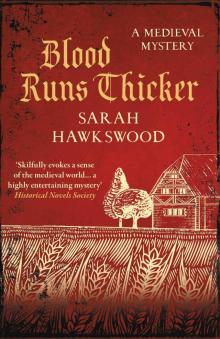 Blood Runs Thicker
Blood Runs Thicker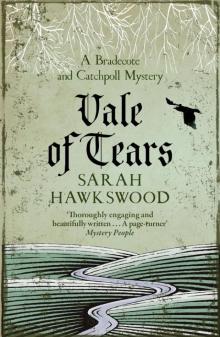 Vale of Tears
Vale of Tears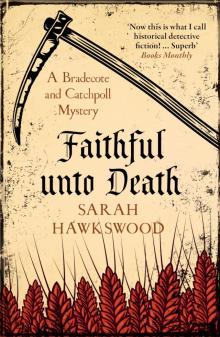 Faithful Unto Death
Faithful Unto Death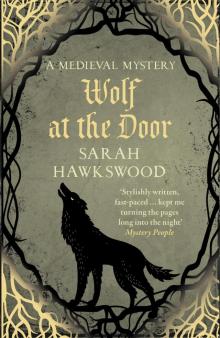 Wolf at the Door
Wolf at the Door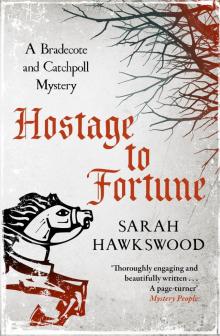 Hostage to Fortune
Hostage to Fortune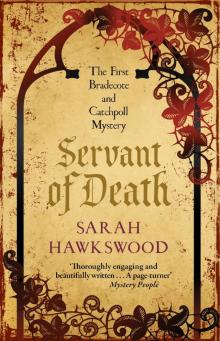 Servant of Death
Servant of Death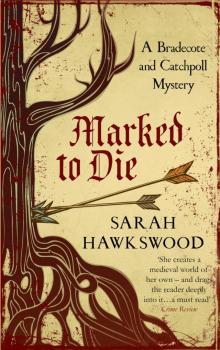 Marked to Die
Marked to Die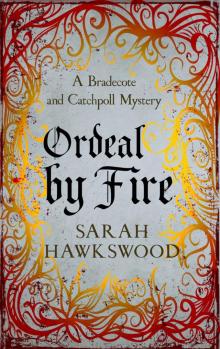 Ordeal by Fire
Ordeal by Fire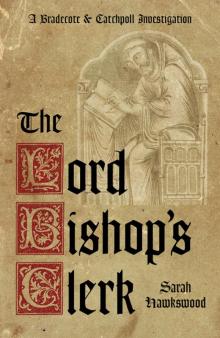 The Lord Bishop's Clerk
The Lord Bishop's Clerk